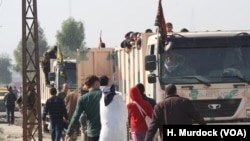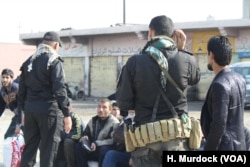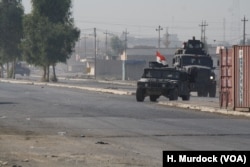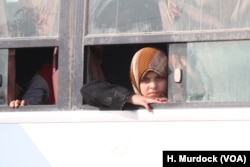"They use bullets in the school classrooms," joked Ratima Ahmed. "One bullet plus one bullet equals two bullets."
Just hours before, she had fled her home in eastern Mosul, where the Iraqi Army now battles Islamic State militants. She sat in the dust with other women and children on the city's outskirts, waiting for buses to transport them to camps. Men sat in a separate group. They didn’t know exactly where they were going, or what they would find when they got there.
This district has become almost uninhabited since the Iraqi Army moved in just days ago. Burned-out cars and tires litter the roads and businesses are shuttered. Buses and trucks full of people fleeing arrive and the men — wearing beards, as ordered by IS militants — are frisked for weapons and told to sit in a separate group.
Just seven kilometers from IS-held Mosul, soldiers and families fear anyone could be a suicide bomber.
"Militants also hang white flags on their cars like refugees so they can get closer to the Iraqi Army before they blow themselves up," explained 15-year-old Dalia. It’s one of many tricks she and other women described.
Increasingly, IS soldiers are wearing black uniforms to masquerade as Iraqi special forces. Many recently have shaved their signature beards, Dalia said.
"When people try to escape IS territory, the militants sometimes go with them and blow themselves up," said Ratima. "And once families are gone, they occupy their houses and pretend to be civilians."
When Ratima's neighbors fled, she said, snipers moved into their house.
Despite the complications, officials in nearby Bartella, a city in ruins after IS rule, said the Iraqi Army is prepared to win coming battles. Soldiers on the front lines have trained in urban warfare and in battling enemies hiding among civilians, according to Sabah al-Numan, spokesman for the Iraqi Counter Terrorism Service.
"We are fighting and we will continue to fight until we finish ISIS," he said. "We believe that when we liberate Mosul that ISIS in Iraq will be finished."
The end of IS rule in parts of Iraq, he added, will safeguard the country from that group, but not necessarily from war and terrorism.
"Terrorists will not be finished, or the war," he said. “But at least ISIS will be finished.”
Departing for camps
Despite their uncertain futures, the women laugh in the relative safety of Gogjali, mocking the militants they fled.
"It’s the first time we’ve seen a woman in jeans sitting outside like that in years," Ratima told me. "There, everyone has to be fully veiled."
Others chimed in with IS dress code complaints. "You can’t wear high heels, because they say shoes should not make ‘clip clop’ sounds," said Dalia.
Even more outrageous, she added, was that her 7-year-old sister was forced to wear an Islamic headscarf for modesty. "When [girls] are 10, they have to be fully veiled," she complained.
Most of the women still had their faces covered, but said this was not the fashion in their area before IS took over. Now they are once again free to dress as they chose. A few, like Dalia, uncover their faces and wear colored headscarves.
But as ladies and children board buses and men clamber into army trucks, where they peer over the edge as they depart, soldiers say this moment of levity may be short-lived. Refugee camps are quickly filling up. Nearly 35,000 people have been displaced from their homes since the offensive to retake Mosul began three weeks ago, according to the International Organization for Migration.
Before it is over, that number could rise to a million, according to officials.
"We were not expecting this many people,” explained one Special Forces soldier. "People are running from IS, but they are also running from lack of food or electricity."















